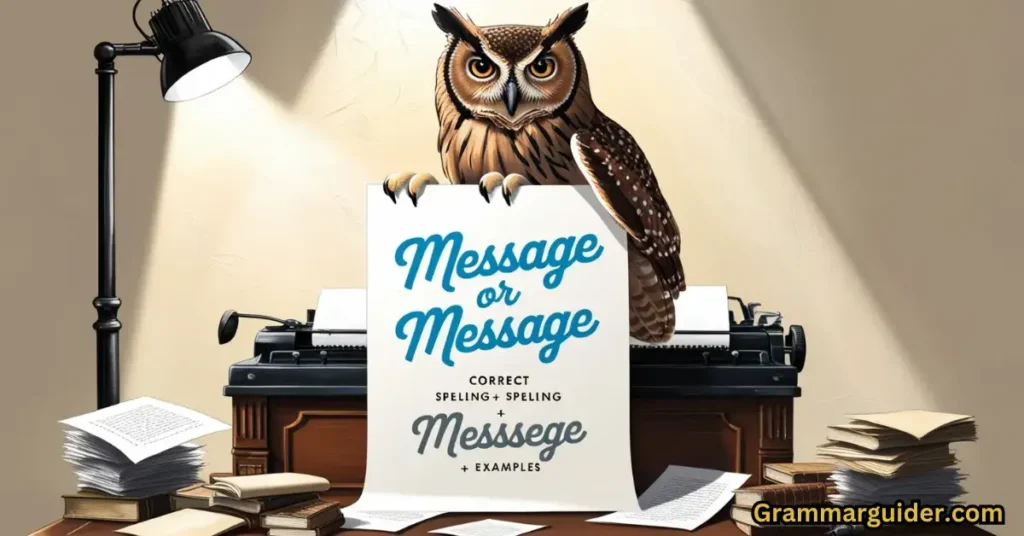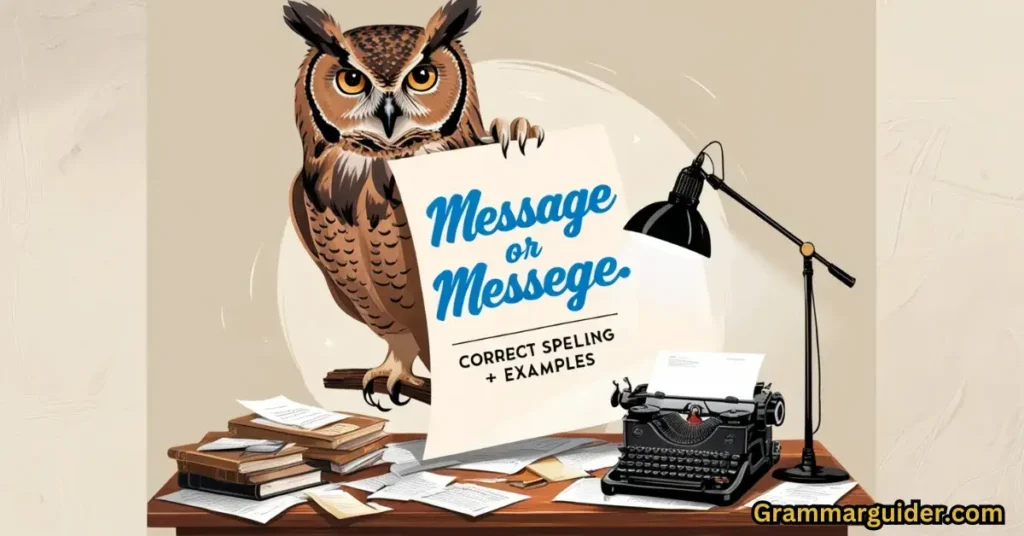In the world of digital communication, spelling errors can sometimes change the meaning of a message or even hinder effective communication. Two commonly confused spellings are “message” and “messege.” While the former is correct, the latter is a misspelled word.
This article will explore the difference between these two words, provide examples in various communication contexts, and offer tips for improving language skills and writing professionalism.
Message vs Messege: What’s the Difference?
Let’s first break down the correct spelling of the word “message.” The word “message” refers to a communication or information sent from one person to another, typically in written form. The incorrect version, “messege,” is a common typo that happens when someone unintentionally switches the letters “s” and “e.”
Common Spelling Mistakes
It’s easy to get confused when typing quickly, especially in the age of text communication and email communication. Autocorrect errors can also play a role, but knowing the correct form—message—is essential for writing professionalism. A small mistake, such as spelling “messege” instead of “message,” can make you appear less careful in your writing, which could affect communication clarity.

Why the Confusion? Understanding Phonetic Confusion
The confusion between message and messege can be partly attributed to phonetic confusion. When spoken, both words sound the same, which can make it easy to overlook the subtle spelling difference. This kind of phonetic confusion is quite common in English, which has many similar-sounding words with different spellings.
Example Scenario 1: Email Communication
Imagine you are writing an email to your colleague, John, about an urgent task. You quickly type out the following:
“Hey John, I wanted to check if you received my messege from earlier today.”
At a glance, this may seem acceptable, but the correct spelling is message. Misspelling it as “messege” can make your email appear unprofessional, even though the meaning remains clear. Such spelling mistakes can undermine the credibility of your professional writing, especially in a business setting.
Example Scenario 2: Text Communication
Now, let’s say you are texting your friend Emma to confirm dinner plans. Your message could look like this:
“Hey Emma, I sent you a messege earlier about meeting up at 7 p.m.”
Again, while the intention is clear, the misspelling “messege” could be confusing. The correct version should be “message.” In casual text communication, spelling errors may be overlooked, but they still impact the writing professionalism of your message.
Common Typos and How to Avoid Them
Typos are an inevitable part of writing, especially when using digital devices like smartphones or computers. The speed and convenience of these devices sometimes lead to typing errors. While autocorrect tools might help fix certain mistakes, they don’t always catch them all. Here are a few tips to help you avoid common misspelled words like “messege”:
Proofreading Tips
- Take your time: Even when in a hurry, try to slow down and proofread your message before sending it.
- Use spelling tools: Many word processors and email programs come with built-in spell-check features. These tools can catch common spelling mistakes, including common typos like “messege.”
- Read aloud: Sometimes reading your message aloud helps you identify mistakes that may have slipped through while typing.
Autocorrect vs Manual Check
While autocorrect tools can be handy, they aren’t foolproof. They might correct certain words but miss others. For example, autocorrect errors might change “message” into “messege” if the program doesn’t recognize the typo. That’s why it’s important to proofread manually and double-check critical communication like professional communication or important emails.
Impact of Misspellings in Professional Communication
In professional settings, misspelling words can have a bigger impact than in casual conversations. Imagine sending an important email to a client or a business partner, and you accidentally type “messege” instead of “message.” Not only does this make you look less competent, but it could also distract from the main point of your message.
Example Scenario 3: Professional Email
Let’s consider a scenario where you’re sending a report to your manager, Sarah. The email might read:
“Dear Sarah, I’ve attached the report as per your messege. Please let me know if you have any questions.”
This mistake would likely be noticed, and while Sarah might still understand your message, she might question your attention to detail. In professional communication, small errors can have a significant impact on your writing professionalism and grammar accuracy.
Misspelling Impact
The impact of a misspelling in a professional message can vary depending on the recipient. In some cases, people might overlook small mistakes, but in more formal settings, such as business emails or job applications, spelling mistakes can make a significant difference in how your communication is perceived.
Improving Language Skills: How to Prevent Misspelled Words
Improving your language skills is key to preventing spelling mistakes in the first place. Here are some strategies to improve your spelling and writing skills:
- Read regularly: The more you read, the more familiar you become with correct spelling and grammar rules.
- Practice writing: Try to write regularly, whether it’s journaling, composing emails, or participating in online forums. This helps build muscle memory for spelling and grammar.
- Use spelling apps: Download apps or use online tools like Grammarly to identify and correct spelling and grammar errors. These tools are great for proofreading and improving language skills.

Spelling Mistakes in Different Forms of Communication
Different forms of communication require different levels of attention to spelling accuracy. Let’s explore how spelling errors impact text communication, email communication, and written content.
Text Communication
In text communication, people tend to type quickly and sometimes neglect proofreading. Since typos are often overlooked in informal text messages, small spelling mistakes like “messege” may not be noticed immediately. However, if the message is important, such as confirming a meeting or discussing work-related topics, it’s still a good idea to double-check your spelling.
Email Communication
In email communication, spelling errors carry more weight. Whether you’re sending a formal business proposal or a casual message to a colleague, the recipient expects clear, accurate writing. Mistakes like “messege” can diminish your professionalism and writing clarity. Always take the time to proofread and use autocorrect tools before hitting send.
Written Content and Documents
For more formal written content, such as reports, essays, or official documents, spelling mistakes are even more critical. They can make you seem less credible or competent. Proofreading is essential in these cases, and using tools like spell check and grammar check can help catch misspelled words.
Table: Common Spelling Mistakes and Corrections
| Incorrect Spelling | Correct Spelling | Explanation |
|---|---|---|
| Messege | Message | A common typo where the letters “s” and “e” are swapped. |
| Acount | Account | Missing the “c” in the middle of the word. |
| Recieve | Receive | The famous “i before e” rule. |
| Definately | Definitely | A common confusion of letters in “definitely.” |
| Seperated | Separated | Misplaced “e” after “p” is a frequent mistake. |
Conclusion
In digital communication, accurate spelling is crucial for communication clarity. Words like message and messege might seem simple, but a misspelling can have a bigger impact than you think. By improving your language skills, paying attention to common spelling mistakes, and using proofreading tips, you can avoid these issues and communicate more effectively. Whether it’s an email, text, or professional document, remember that clarity and professionalism go hand in hand with correct spelling.

Harley Rose is a seasoned expert in English grammar and writing tips, blending years of knowledge and a love for language into her work. With a sharp eye for detail and a talent for making grammar accessible, Harley shares practical insights that help readers write with precision and flair. Her content is ideal for anyone looking to strengthen their writing skills and express themselves with confidence.

